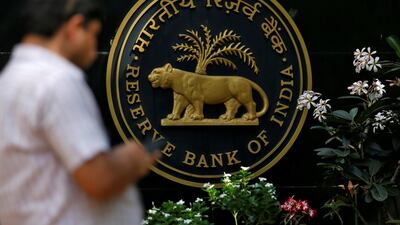India stocks extended declines after the central bank maintained its hawkish stance on inflation while keeping the key policy rate unchanged.
The S&P BSE Sensex declined as much as 1 per cent after the decision and traded 0.7 per cent lower at 35,881.18 as of 3:08pm in Mumbai, little changed from before the decision. The NSE Nifty 50 Index also slipped 0.7 per cent. Markets across Asia tumbled following the biggest slide on Wall Street since mid-October.
After raising interest rates twice this year, the RBI kept its repurchase rate unchanged at 6.5 per cent as predicted by economists surveyed by Bloomberg. Still, policymakers lowered the inflation forecast to a 2.7 per cent to 3.2 per cent range, citing slowing food price increases and a drop in oil prices, while retaining a stance of "calibrated tightening”.
Investors were expecting some steps by policymakers to boost liquidity after lenders were forced to raise rates, while anticipating a lower forecast for inflation amid a drop in the price of crude oil, India’s biggest import, before the outcome of state elections and a national poll next year.
_______________
Read more:
Narendra Modi government tweaks India's economic figures ahead of 2019 elections
Indian government and RBI avert crisis but deep problems linger
_______________
All 19 sector sub-gauges compiled by BSE slipped, led by the S&P BSE Metal Index’s 3.6 per cent loss, with ITC and ICICI Bank the biggest drags on the Sensex.
Tata Motors was among worst performers on the main gauge, sliding 1.9 per cent. The car maker’s long-term rating was downgraded by S&P Global Ratings yesterday.
“No major decision on liquidity won’t have a large bearing on the market as the economy continues to benefit from the sharp fall in crude oil prices,” said Abhimanyu Sofat, head of research at IIFL Securities in Mumbai.
“The liquidity situation for the non-bank finance companies has already begun improving and we are seeing large companies are able to rollover their loans,” Mr Sofat said.

